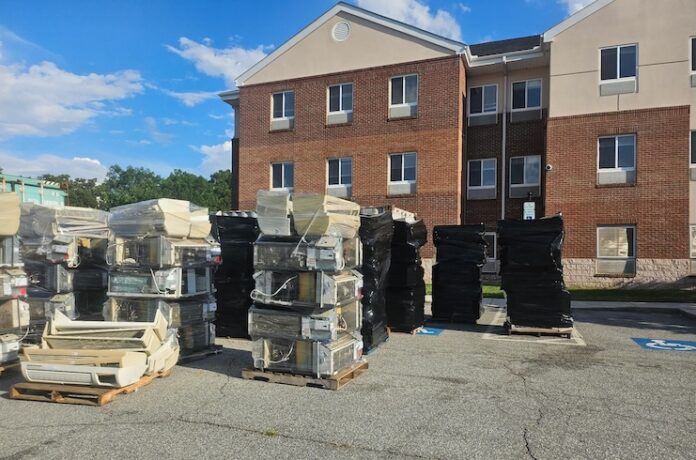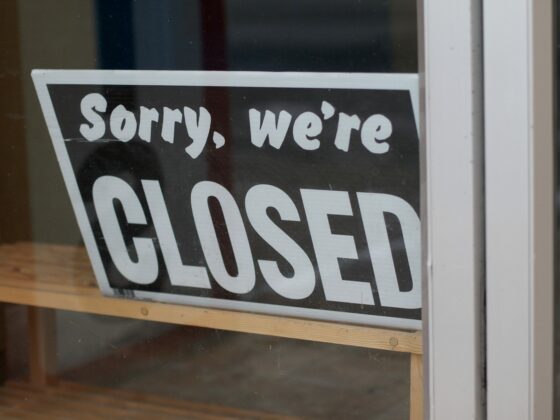
As the hospitality industry sharpens its focus on efficiency, sustainability, and guest experience, hoteliers should take a closer look at how outdated equipment like PTAC units is being handled. According to Nathan Faircloth, director of business development, RoomOne Solutions, hotels may replace seven to 15 percent of their PTAC units annually, and many of those are improperly disposed of. Addressing this issue aligns day-to-day operations with broader environmental goals.
RoomOne offers nationwide PTAC pick up and recycling at no cost to hotels. All hotels need to do is place at least six PTAC units on a pallet in front of the building, and RoomOne will handle the rest, ensuring the units are properly removed from the property.
“For the most part, people just throw them away,” Faircloth said. “By and large, they don’t know that’s against the law. Many don’t realize that it’s also bad for the environment. Part of the reason that they don’t think about it is because they’ve never considered that there may be a vendor that can help. And, especially, I don’t think they’ve considered that anyone does it for free.”
Improper disposal is typically the norm. It isn’t malicious; it’s simply a matter of convenience or lack of awareness. Many properties don’t know it’s illegal to toss these units out like regular trash, or they assume someone else will handle it responsibly.
Below are three of the most common—and problematic—ways that PTAC units get disposed:
1The Dumpster
For many hotel operators, the default solution to PTAC disposal is the dumpster. This method is not only environmentally harmful; it’s also illegal.
PTAC units contain refrigerants that are regulated under the Clean Air Act. Dumping these units can result in leaks if the lines or coils are damaged, which happens more often than people think. Some operators mistakenly believe that the trash company handles sorting or safe disposal, but that’s not the case. “The trash company sorts that out” is a common misconception, according to Faircloth, because usually, the unit ends up in a landfill, releasing hazardous substances.
Best practice: The hotel is already moving the unit out to the dumpster. It takes even less physical effort to place the unit onto a pallet in front of the property than putting it into a dumpster. RoomOne will then take the units away, providing a compliant, responsible solution.
2The “Scrapper”
Another common approach is using an independent “scrapper” to haul away old, broken PTAC units. While this might seem like a win, it’s far from a risk-free solution. Faircloth explained, “The person could throw their back out. They could back into your loading dock. Theoretically, they might be disposing the units the wrong way, and you could wind up being liable for having transacted with them.”
Even if well-intentioned, these individuals are often not certified recyclers and are usually “unlicensed contractors.” Without proper vetting, working with them puts the property at legal risk. Faircloth said, “This is technically negligence if this person isn’t a certified recycler. The hotel is supposed to vet this person and make sure the person has insurance for liability and EPA certification.”
Safety risks are also important to consider. Faircloth added, “If I were a hotel owner, I would be worried that the person could get hurt on site.”
Best practice: Partner with a certified, insured service that understands the hospitality environment and handles the materials the right way, both legally and logistically.
3The Guestroom Graveyard
When operators aren’t sure how to properly dispose of PTAC units and other items like mattresses, they often end up in an empty guestroom or another empty space like a storage closet or even a gym. This temporary solution can turn permanent, costing hotels space and revenue. Not only is this clutter unsightly and inefficient, but it can also slow down operations, leading to lost revenue. The problem rarely, if ever, resolves itself.
Best practice: Faircloth said, “This isn’t the best to do because the waste or junk just stays on the property. RoomOne will pick up the units anywhere in the country at no cost. It’s easy and free to do the right thing.”
A Free Solution to Improper PTAC Disposal
RoomOne offers a simple solution that hoteliers can use to properly dispose of PTAC units. Hotels simply place a minimum of six broken, unused, or unwanted PTAC units on a pallet, contact RoomOne, and schedule a pick up, free of charge.
To keep this service completely free for customers, RoomOne recycles, repairs, and sometimes resells usable PTAC units and parts. “If we get a unit that can’t be repaired, we break it down into components that we can either reuse or resell,” Faircloth explained. “If the components aren’t reusable, then we break them down into materials—scrap metal, copper, everything else—that we send to a recycler.”
RoomOne partners with many national hotel brands. These partnerships include flag-level agreements with Wyndham Hotels & Resorts, BWH Hotels, Choice Hotels International, and IHG Hotels & Resorts. For these brands, RoomOne supports broader sustainability targets and goals as well as operational efficiencies. It’s a simple, cost-free way to streamline operations, support eco-conscious initiatives, and strengthen a hotel’s reputation with its stakeholders and in its market, all while ensuring the dumpster, the “scrapper,” and the guestroom graveyard are in the past of PTAC unit disposal.
For more information, contact Owen Finch, sourcing account executive, RoomOne Solutions, at owen.finch@roomonesolutions.com. Sponsored by RoomOne Solutions.









